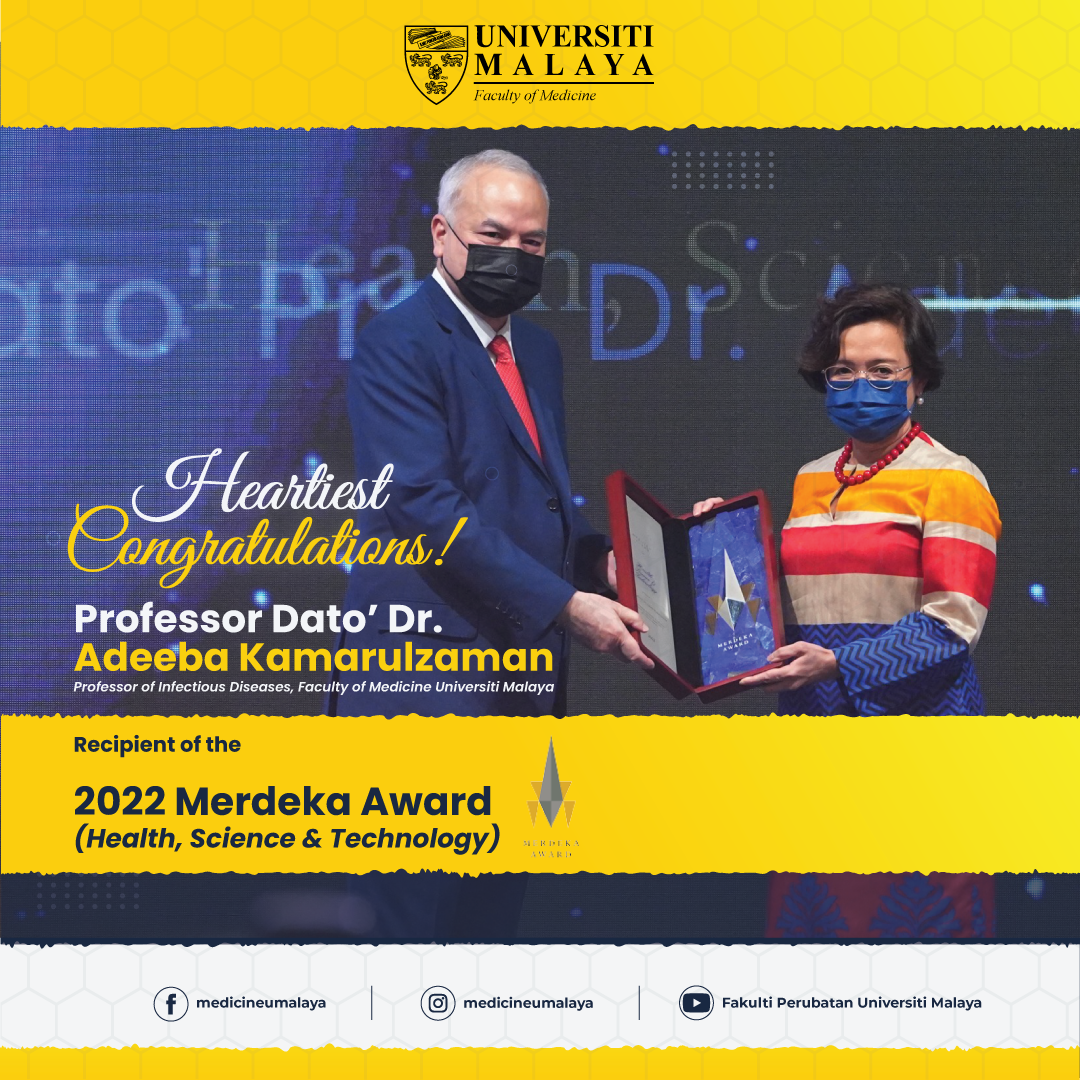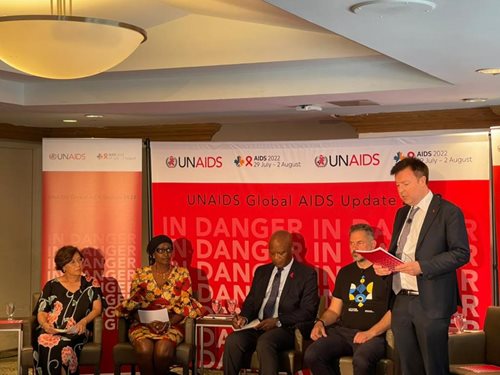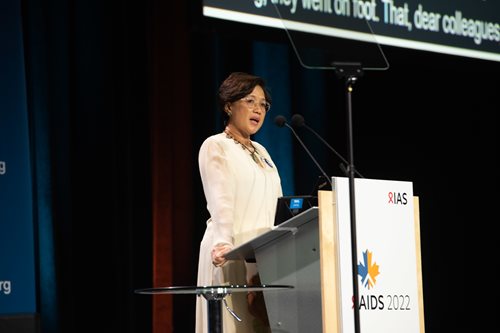CONGRATULATIONS to Y.Bhg.Professor Dato' Dr. Adeeba Kamarulzaman
for the prestigious award.

Article taken from The Merdeka Award website: https://www.merdekaaward.my/the-award/past-recipients/health,-science-technology/dato-professor-dr-adeeba-kamarulzaman
Dato’ Professor Dr Adeeba Kamarulzaman, presently an Academy of Sciences Malaysia (ASM) fellow who specialises in HIV/AIDS, has made an impact on the prevention, treatment and research of infectious diseases and HIV/AIDS for more than 30 years. Dr Adeeba is a highly respected specialist in her field and a committee member of various prestigious regional and worldwide organisations. They include groups like the UNAIDS Scientific Expert Panel, the WHO Strategic and Technical Advisory Groupon HIV, the WHO Science Council, the Governing Council of the International AIDS Society, etc. In fact, in 2020, Dr Adeeba was chosen to lead the International AIDS Society as its first Asian president.
In her capacity, she currently serves as a professor of Medicine and Infectious Diseases under the Faculty of Medicine, University of Malaya. The University of Malaya Medical Centre’s Infectious Disorders Unit was founded by Dr Adeeba in 1996, and under her direction, it has grown to become one of the nation’s top tertiary referral centers for HIV/AIDS and infectious diseases. In 2011, she was made Dean of the Faculty of Medicine, the first female dean for this oldest medical school in Malaysia. Her years there made a substantial contribution to the University of Malaya by aiding in the revision of the medical curriculum to produce the best medical professionals for the country.

"Something that is worth doing is often tough, but the rewards can be big.”
- Dato’ Professor Dr Adeeba Kamarulzaman -
She was actively involved in starting the Malaysian government’s change in its response in drug use, which resulted in the implementation of harm reduction programmes to prevent HIV transmission among people who use drugs, in addition to her clinical and academic responsibilities.
She then founded the University of Malaya’s Centre of Excellence for Research in AIDS (CERiA) in 2008. CERiA conducts research activities that include clinical and fundamental science studies, epidemiological research, and socio-behavioural research with a focus on Malaysia’s marginalised communities, including people who use drugs, people in prisons, men-who-have-sex-with-men. In a short amount of time, CERiA has been able to secure numerous local and foreign research funding, including those from the Foundation for AIDS Research (amfAR), the USA National Institutes of Health and the World Bank, the National Institutes of Health, and the Ministry of Higher Education of Malaysia.
She also once held the position of President of the Malaysian AIDS Council, an organisation that acted as a hub for HIV-related organisations in Malaysia. In that role, she promoted and managed the implementation of community-based HIV/AIDS programmes throughout the nation. She continues to serve as Chairman of the Malaysian AIDS Foundation, a Trust whose goal is to raise funds for the HIV prevention, care, and treatment programmes run by the Malaysian AIDS Council.

With Tun Dr Siti Hasmah at the Malaysian AIDS Foundation Red Ribbon Gala
Her list of achievements goes on and on. One of her most remarkable contributions - not works and services to the country is the dramatic drop in the rate of new HIV/AIDS infections by 50 per cent over the previous 10 years Needle Syringe Exchange Programme (NSEP) - which is through a combination of opioid substitution therapy and a needle exchange programme. She also successfully fought for harm reduction programmes that safeguard the lives, health, and dignity of people who use drugs, and their communities while preventing HIV transmission among people who use drugs. She also successfully reformed existing drug policies and pushed for a public health approach that decriminalises people who use drugs.

At The Release of UNAIDS Global AIDS Report 2022
Additionally, with the recent outbreak of COVID-19 in Malaysia, Dr Adeeba heads the effort to combat COVID-19 by serving as the chair of the University Malaya Medical Centre (UMMC) COVID-19 Task Force COVID-19, National Recovery Council and Johor COVID-19 Health Advisory Committee.
Having contributed so much due to her commitment to mitigating the spread of HIV/AIDS cases, awards and accolades are no stranger to her as she truly deserves them. The numerous honors Dr Adeeba has received, such as the Australian-Asian Fellowship Award in 2001, the Tun Mahathir Award and the Merdeka Award (she was a member of the Nipah Investigative Team) in 2008, and the first Advance Australia Global Award in the Category of Alumni in 2012, are testimonies to the success of her work.
She was also named as one of the Top 20 most influential female scientists in the Muslim World and is possibly the only Malaysian to have been profiled in both The Lancet together with Nobel Laureate, Professor Francoise Barre-Sinoussi, she co-chaired the 7th IAS Conference on Pathogenesis, Treatment and Prevention which was held in Kuala Lumpur and attracted more than 5,000 scientists, researchers, and healthcare workers from around the world. She also recently chaired the 24th International AIDS Conference in Montreal with almost 13,000 participants. Last but not least, she has been cited over 10,000 times for her influential publications and research work in her discipline.

Dr Adeeba speaks at the 24th International AIDS Conference (AIDS 2022) in Montreal, Canada
Passion comes and goes, but not for Professor Dr Adeeba, which is especially visible in her work. Her exact words; “I think seeing the changes that have come about despite all the barriers and challenges keeps me motivated and of course seeing the successes in terms of the numbers of infections averted and seeing patients lead healthy and productive lives. And having the advances in medical science and being part of it, whether it is in prevention, treatment or the search for a cure that could make the goal of ending AIDS a reality”.




